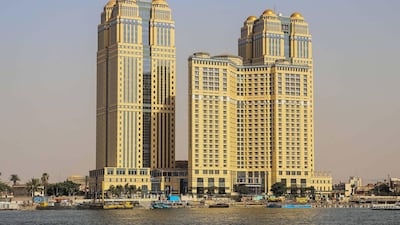Egypt’s prosecutor-general on Tuesday temporarily halted a high-profile case and investigation into the alleged gang rape of a young woman at a luxury Cairo hotel, known as the Fairmont Incident, citing insufficient evidence.
The country’s top prosecutor also ordered the release of all the suspects in the case, most of whom had been in police custody for months, while the investigation proceeded amid fierce public controversy.
Egypt’s Public Prosecution issued a nine-page statement on Facebook on Tuesday night, saying that, over the course of nine months, its investigation “had exhausted all its means to reach the truth in the case”.
“What we were able to conclude was that the victim was taken by the defendants into a hotel suite without her consent where she lost consciousness following a private party she attended at the hotel in 2014. However, the evidence was not sufficient to present the defendants before a criminal court,” it said.
The announcement that the defendants were to be released was likely to spark uproar in Egypt, where the alleged gang rape shocked the public.
The accused have been vilified on social media in recent months and their photographs have been shared widely online.
The statement outlined how thorough the prosecution’s investigation was, explaining that since the case began gaining attention on social media in July of last year, the prosecutor has been working non-stop to bring the culprits to justice.
The public prosecution’s statement detailed the statements and testimonies gathered by the investigation, including the victim’s own account. Additionally, another testimony was recorded from an eyewitness who was inside the hotel suite when the alleged rape took place.
Some 39 other testimonies were taken from people alleging to have seen parts of a video of the incident, it said.
A video of the alleged gang rape is believed to have circulated widely after the incident took place.
Investigators were unable to get hold of the video.
According to the statement, one witness came forward claiming that someone had sent him the video to an old email address, but that he had deleted it from his inbox at the time. Investigators reached out to the email service provider for help, but were told it was not going to be possible to retrieve the file.
In another lead, investigators heard that “a female foreign national living in an Arab country” had a copy of the video.
But when brought in for questioning, the woman denied having it.
Even after hotel staff, forensic doctors, police officers and others contributed to the investigation, the only piece of tangible evidence found was a photo of the naked body of a young woman, the statement said, adding that this could not be used as evidence because her face was not showing and there was no one else in the picture.
“Since the beginning of the investigation, the Public Prosecution has been keen to carry out legal action against the accused, issuing travel bans against them, issuing arrest warrants and even co-operating with international law enforcement to have them returned to Egypt when they did leave the country,” the statement said.
Efforts to acquire more evidence against the defendants proved fruitless, the statement read.
The prosecution revealed that there were inconsistencies in witness testimonies regarding the exact date of the private party during which the gang rape supposedly took place, which cast doubt on eyewitness accounts. In the absence of video or photographic evidence, these accounts were considered the strongest evidence against the defendants.
Prosecutors said the case was dealt another blow when some people who had testified in support of the victim, in the early stages of the investigation, retracted their statements.
Other testimonies claimed the encounter was consensual, and that the victim willingly took the date rape drug involved in the incident.
Despite taking place over seven years ago, the Fairmont incident remained largely uncovered until the landmark trial of serial sex offender Ahmed Bassam Zaki, which brought the issue of sexual assault to the fore in Egypt.
That trial set off a wave of social media activism that many called Egypt’s #MeToo movement.
Zaki was sentenced to 8 years in prison last month for his crimes, a ruling that was considered a victory for campaigners trying to bring the issue to light in Egypt.
Sherif El Koumi, Youssef Qarra and Amir Zayed, three of the nine defendants in the Fairmont Incident case, were referred to a criminal court last month for another alleged sexual assault.
The three are accused of raping another woman at a resort on Egypt’s Mediterranean coast.
Evidence against the three defendants in the second rape case included testimonies from the victim and six witnesses.


